中考英语语法知识难点大全TXT版
历年中考英语语法知识点难点总结

中考英语语法知识难点大全英语语法知识难点〔一〕〔一〕形容词和副词I.要点A.形容词1、形容词的用法形容词是用来修饰、描绘名词的,通常在句中作定语、表语或宾补,有时还可作状语。
如:He is honest and hardworking. I found the book interesting.某些形容词及定冠词连用表示一类人作主语时,谓语通常用复数形式。
如:The rich and the poor live in different parts of the city.The English like to be with their families.多个形容词作定语修饰名词的顺序:冠词+序数词+基数词+性质状态〔描述性〕+形状大小+新旧老少+颜色+国籍+材料+名词。
如:the second five interesting big new red Chinese wall papers.2、形容词比拟等级的形式〔1〕规那么形式一般说来,单音节词及少数双音节词在后加-er; --est 来构成比拟级和最高级;其他双音节词及多音节词在前加more, most.如:great-greater-greatest busy-busier-busiest important-more important-(the)most important〔2〕不规那么形式good (well)-better-best bad (ill)-worse-worst many (much)-more-most little-less-least〔3〕形容词比拟等级的用法①表示两者的比拟,用形容词的比拟级+than. 如:He is cleverer than the other boys. This one is more beautiful than that one.②表示两者以上的比拟,用"the +形容词最高级〔+名词〕+of(in) …"如:He is the cleverest boy in his class.③表示两者是同等程度,用"as +形容词原级+as". 如:He is as tall as I. I have as many books as you.④越… 越…例如:The more I learn, the happier I am.⑤You can never be too careful. 越小心越好又如:You can never praise the teacher too highly.你怎么赞扬这个教师也不过分。
初中英语语法知识难点总结(精编全面)

中考英语语法知识难点大全英语语法知识难点(一)(一)形容词和副词I.要点A.形容词1、形容词的用法形容词是用来修饰、描绘名词的,通常在句中作定语、表语或宾补,有时还可作状语。
如:He is honest and hardworking.I found the book interesting.某些形容词与定冠词连用表示一类人作主语时,谓语通常用复数形式。
如:The rich and the poor live in different parts of the city.The English like to be with their families.多个形容词作定语修饰名词的顺序:冠词+序数词+基数词+性质状态(描述性)+形状大小+新旧老少+颜色+国籍+材料+名词。
如:the second five interesting big new red Chinese wall papers.2、形容词比较等级的形式(1)规则形式一般说来,单音节词及少数双音节词在后加-er; --est 来构成比较级和最高级;其他双音节词及多音节词在前加more, most.如:great-greater-greatestbusy-busier-busiestimportant-more important-(the)most important(2)不规则形式good (well)-better-bestbad (ill)-worse-worstmany (much)-more-mostlittle-less-least(3)形容词比较等级的用法①表示两者的比较,用形容词的比较级+than. 如:He is cleverer than the other boys.This one is more beautiful than that one.②表示两者以上的比较,用"the +形容词最高级(+名词)+of(in) …"如:He is the cleverest boy in his class.③表示两者是同等程度,用"as +形容词原级+as". 如:He is as tall as I.I have as many books as you.④越… 越…例如:The more I learn, the happier I am.⑤You can never be too careful. 越小心越好又如:You can never praise the teacher too highly.你怎么赞扬这个老师也不过分。
初中英语中考语法重点难点知识汇总
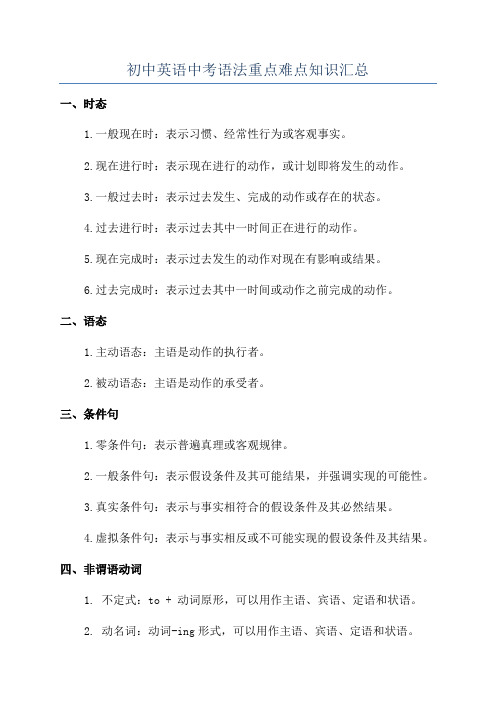
初中英语中考语法重点难点知识汇总一、时态1.一般现在时:表示习惯、经常性行为或客观事实。
2.现在进行时:表示现在进行的动作,或计划即将发生的动作。
3.一般过去时:表示过去发生、完成的动作或存在的状态。
4.过去进行时:表示过去其中一时间正在进行的动作。
5.现在完成时:表示过去发生的动作对现在有影响或结果。
6.过去完成时:表示过去其中一时间或动作之前完成的动作。
二、语态1.主动语态:主语是动作的执行者。
2.被动语态:主语是动作的承受者。
三、条件句1.零条件句:表示普遍真理或客观规律。
2.一般条件句:表示假设条件及其可能结果,并强调实现的可能性。
3.真实条件句:表示与事实相符合的假设条件及其必然结果。
4.虚拟条件句:表示与事实相反或不可能实现的假设条件及其结果。
四、非谓语动词1. 不定式:to + 动词原形,可以用作主语、宾语、定语和状语。
2. 动名词:动词-ing形式,可以用作主语、宾语、定语和状语。
3. 现在分词:动词-ing形式,可作定语、表语等。
4. 过去分词:-ed或不规则变化形式,常用作被动语态和完成时。
五、情态动词1. can/could:表示能力、许可、可能等。
2. may/might:表示允许、请求、可能、推测等。
3. must:表示推测、肯定、必需等。
4. should:表示义务、建议、推测、必要等。
六、名词1.可数名词与不可数名词及其用法。
2.名词所有格的表示方法。
七、代词1.人称代词:主格、宾格、物主代词、反身代词等。
2. 指示代词:this, that, these, those等。
3. 不定代词:some, any, no, every, all, both等。
八、形容词与副词1.形容词的比较级和最高级形式及其用法。
2.副词的比较级和最高级形式及其用法。
九、连词1. 并列连词:and, or, but等。
2. 从属连词:because, when, if, although等。
中考英语语法重点难点知识全汇总

中考英语语法重点难点知识全汇总一.英语语法重点与难点1、 asas结构:Youre a boy as good as Tom.=Youre as good a boy as Tom.你和汤姆是一样好的孩子。
2、 (1)tooto与 sothat sb. cant的句型转换:前者为简单句,主语只有一个,而后者为复合句,主语有两个,试比较:The man was too angry to be able to speak.The man was so angry that he wasnt able to speak.(2) tooto与 not enough to句型的转换:He is too young to get married.=He is not old enough to get married.The book is too difficult for me to read.=The book is not easy enough for me to read.3、形容词原级表示比较级含义:约翰不象迈克那么苯。
John is not so stupid as Mike.John is less stupid than Mike.John is cleverer than Mike.4、用比较级表示最高级:约翰是班里最高的男生。
John is taller than any other boy in the class.John is the tallest boy in the class.5、 the more.. the more.表示越越:The more books you read,the wider your knowledge is.The more food you eat,the fatter you are.6、 more and more.表示越来越:Moreand more students realized the importance of a foreign language.Our country is getting stronger and stronger.二.中考考点词组1. after, in 这两个介词都可以表示(时间)以后的意思after 以过去为起点,表示过去一段时间之后,常用于过去时态的句子中如:She went after three days. 她是三天以后走的in 以现在为起点,表将来一段时间以后,常用于将来时态的句子中如:She will go in three days. 她三天以后要走2. how long, how often, how soonhow long指多长时间,主要用来对一段时间(如three days, four weeks 等)提问?如:How long ago was it?这是多久前的事了?how often指每隔多久,主要用来对频率副词或状语(如once a week等)提问?如:How often does he come here? Once a month. 他(每隔)多久来一次?每月一次。
中考英语语法知识难点大全TXT版

中考英语语法知识难点大全英语语法知识难点(一)??? 编稿:李俊和审稿:李俊和责编: 张晓俊(一)形容词和副词I.要点A.形容词1、形容词的用法形容词是用来修饰、描绘名词的,通常在句中作定语、表语或宾补,有时还可作状语。
如:He is honest and hardworking. I found the book interesting. 某些形容词与定冠词连用表示一类人作主语时,谓语通常用复数形式。
如:The rich and the poor live in different parts of the city. The English like to be with their families. 多个形容词作定语修饰名词的顺序:冠词+序数词+基数词+性质状态(描述性)+形状大小+新旧老少+颜色+国籍+材料+名词。
如:the second five interesting big new red Chinese wall papers. 2、形容词比较等级的形式(1)规则形式一般说来,单音节词及少数双音节词在后加-er; --est 来构成比较级和最高级;其他双音节词及多音节词在前加more, most.如:great-greater-greatest busy-busier-busiest important-more important-(the)most important (2)不规则形式good (well)-better-best bad (ill)-worse-worst many (much)-more-most little-less-least (3)形容词比较等级的用法①表示两者的比较,用形容词的比较级+than. 如:He is cleverer than the other boys. This one is more beautiful than that one. ②表示两者以上的比较,用"the +形容词最高级(+名词)+of(in) …"如:He is the cleverest boy in his class. ③表示两者是同等程度,用"as +形容词原级+as". 如:He is as tall as I. I have as many books as you. ④越…越…例如:The more I learn, the happier I am. ⑤ You can never be too careful. 越小心越好又如:You can never praise the teacher too highly. 你怎么赞扬这个老师也不过分。
初中英语中考语法重点难点知识汇总

中考英语语法重点难点知识汇总一.英语语法重点与难点1、 as…as…结构:You’re a boy as good as Tom.=You’re as good a boy as Tom.你和汤姆是一样好的孩子。
2、 (1)too…to与 so…that sb. can’t…的句型转换:前者为简单句,主语只有一个,而后者为复合句,主语有两个,试比较:The man was too angry to be able to speak.The man was so angry that he wa sn’t able to speak.(2) too…to…与 not enough to句型的转换:He is too young to get married.=He is not old enough to get married.The book is too difficult for me to read.=The book is not easy enough for me to read.3、形容词原级表示比较级含义:约翰不象迈克那么苯。
John is not so stupid as Mike.John is less stupid than Mike.John is cleverer than Mike.4、用比较级表示最高级:约翰是班里最高的男生。
John is taller than any other boy in the class.John is the tallest boy in the class.5、 the more….. the more….表示“越……越……”:The more books you read, the wider your knowledge is.The more food you eat, the fatter you are.6、 more and more….表示“越来……越……”:More and more students realized the importance of a foreign language.Our country is getting stronger and stronger.二.中考考点—词组1. after, in 这两个介词都可以表示“……(时间)以后”的意思after 以过去为起点,表示过去一段时间之后,常用于过去时态的句子中如:She went after three days. 她是三天以后走的in 以现在为起点,表将来一段时间以后,常用于将来时态的句子中如:She will go in three days. 她三天以后要走2. how long, how often, how soonhow long指多长时间,主要用来对一段时间(如three days, four weeks 等)提问?如:How long ago was it? 这是多久前的事了?how often指每隔多久,主要用来对频率副词或状语(如once a week等)提问?如:—How often does he come here? —Once a month. 他(每隔)多久来一次?每月一次。
初中英语中考语法重点难点知识汇总

中考英语语法重点难点知识汇总一.英语语法重点与难点1、 as…as…结构:You’re a boy as good as Tom.=You’re as good a boy as Tom.你和汤姆是一样好的孩子。
2、 (1)too…to与 so…that sb. can’t…的句型转换:前者为简单句,主语只有一个,而后者为复合句,主语有两个,试比较:The man was too angry to be able to speak.The man was so angry that he wa sn’t able to speak.(2) too…to…与 not enough to句型的转换:He is too young to get married.=He is not old enough to get married.The book is too difficult for me to read.=The book is not easy enough for me to read.3、形容词原级表示比较级含义:约翰不象迈克那么苯。
John is not so stupid as Mike.John is less stupid than Mike.John is cleverer than Mike.4、用比较级表示最高级:约翰是班里最高的男生。
John is taller than any other boy in the class.John is the tallest boy in the class.5、 the more….. the more….表示“越……越……”:The more books you read, the wider your knowledge is.The more food you eat, the fatter you are.6、 more and more….表示“越来……越……”:More and more students realized the importance of a foreign language.Our country is getting stronger and stronger.二.中考考点—词组1. after, in 这两个介词都可以表示“……(时间)以后”的意思after 以过去为起点,表示过去一段时间之后,常用于过去时态的句子中如:She went after three days. 她是三天以后走的in 以现在为起点,表将来一段时间以后,常用于将来时态的句子中如:She will go in three days. 她三天以后要走2. how long, how often, how soonhow long指多长时间,主要用来对一段时间(如three days, four weeks 等)提问?如:How long ago was it? 这是多久前的事了?how often指每隔多久,主要用来对频率副词或状语(如once a week等)提问?如:—How often does he come here? —Once a month. 他(每隔)多久来一次?每月一次。
中考英语语法知识难点大全

中考英语语法知识难点大全II.例题〔一〕形容词和副词I.要点A.形容词1、形容词的用法形容词是用来修饰、描画名词的,通常在句中作定语、表语或宾补,有时还可作状语。
如:He is honest and hardworking.I found the book interesting.某些形容词与定冠词连用表示一类人作主语时,谓语通常用复数形式。
如:The rich and the poor live in different parts of the city.The English like to be with their families.多个形容词作定语修饰名词的顺序:冠词+序数词+基数词+性质状态〔描述性〕+形状大小+新旧老少+颜色+国籍+材料+名词。
如:the second five interesting big new red Chinese wall papers.2、形容词比较等级的形式〔1〕规那么形式一样讲来,单音节词及少数双音节词在后加-er; --est 来构成比较级和最高级;其他双音节词及多音节词在前加more, most.如:great-greater-greatestbusy-busier-busiestimportant-more important-(the)most important〔2〕不规那么形式good (well)-better-bestbad (ill)-worse-worstmany (much)-more-mostlittle-less-least〔3〕形容词比较等级的用法①表示两者的比较,用形容词的比较级+than. 如:He is cleverer than the other boys.This one is more beautiful than that one.②表示两者以上的比较,用"the +形容词最高级〔+名词〕+of(in) …"如:He is the cleverest boy in his class.③表示两者是同等程度,用"as +形容词原级+as". 如:He is as tall as I.I have as many books as you.④越… 越…例如:The more I learn, the happier I am.⑤You can never be too careful. 越小心越好又如:You can never praise the teacher too highly.你如何颂扬那个老师也只是分。
中考英语语法知识总结
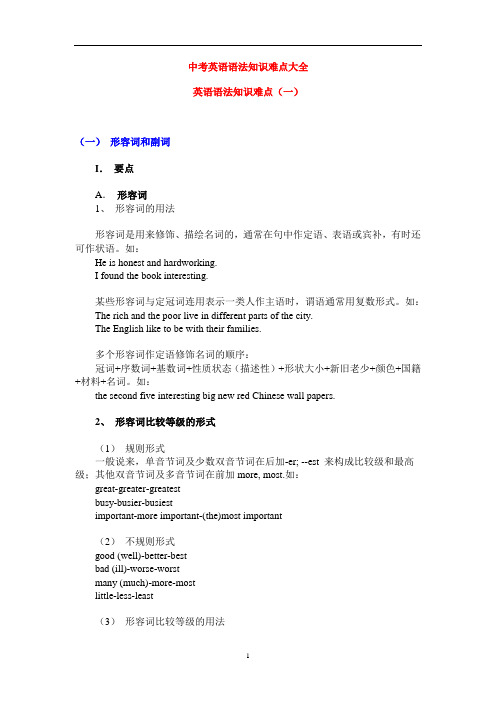
中考英语语法知识难点大全英语语法知识难点(一)(一)形容词和副词I.要点A.形容词1、形容词的用法形容词是用来修饰、描绘名词的,通常在句中作定语、表语或宾补,有时还可作状语。
如:He is honest and hardworking.I found the book interesting.某些形容词与定冠词连用表示一类人作主语时,谓语通常用复数形式。
如:The rich and the poor live in different parts of the city.The English like to be with their families.多个形容词作定语修饰名词的顺序:冠词+序数词+基数词+性质状态(描述性)+形状大小+新旧老少+颜色+国籍+材料+名词。
如:the second five interesting big new red Chinese wall papers.2、形容词比较等级的形式(1)规则形式一般说来,单音节词及少数双音节词在后加-er; --est 来构成比较级和最高级;其他双音节词及多音节词在前加more, most.如:great-greater-greatestbusy-busier-busiestimportant-more important-(the)most important(2)不规则形式good (well)-better-bestbad (ill)-worse-worstmany (much)-more-mostlittle-less-least(3)形容词比较等级的用法①表示两者的比较,用形容词的比较级+than. 如:He is cleverer than the other boys.This one is more beautiful than that one.②表示两者以上的比较,用"the +形容词最高级(+名词)+of(in) …"如:He is the cleverest boy in his class.③表示两者是同等程度,用"as +形容词原级+as". 如:He is as tall as I.I have as many books as you.④越… 越…例如:The more I learn, the happier I am.⑤You can never be too careful. 越小心越好又如:You can never praise the teacher too highly.你怎么赞扬这个老师也不过分。
中考英语语法知识点大全

中考英语语法知识点大全(重点+难点)英语语法知识难点(一)(一)形容词和副词I.要点A.形容词1、形容词的用法形容词是用来修饰、描绘名词的,通常在句中作定语、表语或宾补,有时还可作状语。
如:He is honest and hardworking.I found the book interesting.某些形容词与定冠词连用表示一类人作主语时,谓语通常用复数形式。
如:The rich and the poor live in different parts of the city.The English like to be with their families.多个形容词作定语修饰名词的顺序:冠词+序数词+基数词+性质状态(描述性)+形状大小+新旧老少+颜色+国籍+材料+名词。
如:the second five interesting big new red Chinese wall papers.2、形容词比较等级的形式(1)规则形式一般说来,单音节词及少数双音节词在后加-er; --est 来构成比较级和最高级;其他双音节词及多音节词在前加more, most.如:great-greater-greatestbusy-busier-busiestimportant-more important-(the)most important(2)不规则形式good (well)-better-bestbad (ill)-worse-worstmany (much)-more-mostlittle-less-least(3)形容词比较等级的用法①表示两者的比较,用形容词的比较级+than. 如:He is cleverer than the other boys.This one is more beautiful than that one.②表示两者以上的比较,用"the +形容词最高级(+名词)+of(in) …"如:He is the cleverest boy in his class.③表示两者是同等程度,用"as +形容词原级+as". 如:He is as tall as I.I have as many books as you.④越… 越…例如:The more I learn, the happier I am.⑤ You can never be too careful. 越小心越好又如:You can never praise the teacher too highly.你怎么赞扬这个老师也不过分。
中考英语必考语法难点整理汇总(包含常见错误纠正)

中考英语必考语法难点整理汇总(包含常见错误纠正)一、动词时态与语态时态和语态的结合是语法学习中的重点和难点,尤其是在复杂句中应用时。
1. 动词时态难点:多种时态混用例句:By the time we got there, the train had already left.(到我们到达的时候,火车已经离开了。
)He has been working here since he graduated.(自从他毕业以来,他一直在这里工作。
)解析:强调完成和持续的动作时,常用完成时态。
2. 语态难点:被动语态的复杂结构例句:The project is being discussed by the team.(这个项目正在被团队讨论。
)The work should have been completed by now.(这项工作本应已经完成。
)解析:注意助动词搭配及时态的一致性。
二、非谓语动词1. 动名词与不定式难点:动词后接不定式或动名词的区别例句:I enjoy reading books in my free time.(我喜欢在空闲时间读书。
)He decided to leave early.(他决定早点离开。
)解析:动名词:多用于表示一般习惯或已经发生的事情。
不定式:多用于表达未来意图或计划。
2. 分词作状语难点:分词的逻辑主语问题例句:Having finished his homework, he went out to play.(完成作业后,他出去玩了。
)Seen from the top of the hill, the city looks beautiful.(从山顶上看,这座城市很美。
)解析:分词的逻辑主语需与主句的主语一致。
三、从句相关语法难点1. 定语从句中的关系词省略难点:何时可以省略关系词例句:The book (that) I borrowed is interesting.(我借的书很有趣。
中考英语语法知识点难点总结精选文档
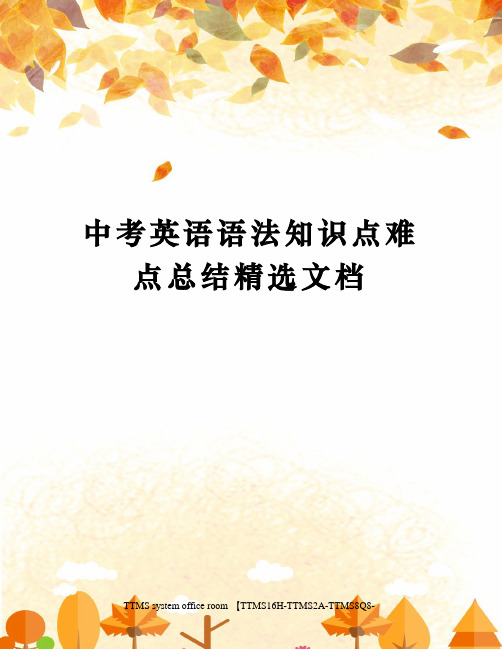
中考英语语法知识点难点总结精选文档TTMS system office room 【TTMS16H-TTMS2A-TTMS8Q8-2016年中考英语语法知识难点大全英语语法知识难点(一)(一)形容词和副词I.要点A.形容词1、形容词的用法形容词是用来修饰、描绘名词的,通常在句中作定语、表语或宾补,有时还可作状语。
如:He is honest and hardworking. I found the book interesting.某些形容词与定冠词连用表示一类人作主语时,谓语通常用复数形式。
如:The rich and the poor live in different parts of the city.The English like to be with their families.多个形容词作定语修饰名词的顺序:冠词+序数词+基数词+性质状态(描述性)+形状大小+新旧老少+颜色+国籍+材料+名词。
如:the second five interesting big new red Chinese wall papers.2、形容词比较等级的形式(1)规则形式一般说来,单音节词及少数双音节词在后加-er; --est 来构成比较级和最高级;其他双音节词及多音节词在前加more, most.如:great-greater-greatest busy-busier-busiest important-more important-(the)most important(2)不规则形式good (well)-better-best bad (ill)-worse-worst many (much)-more-most little-less-least(3)形容词比较等级的用法①表示两者的比较,用形容词的比较级+than. 如:He is cleverer than the other boys. This one is more beautiful than that one.②表示两者以上的比较,用"the +形容词最高级(+名词)+of(in) …"如:He is the cleverest boy in his class.③表示两者是同等程度,用"as +形容词原级+as". 如:He is as tall as I. I have as many books as you.④越… 越…例如:The more I learn, the happier I am.⑤ You can never be too careful. 越小心越好又如:You can never praise the teacher too highly.你怎么赞扬这个老师也不过分。
历年中考英语语法知识点难点总结

中考英语语法知识难点大全英语语法知识难点(一)(一)形容词和副词I.要点A.形容词1、形容词的用法形容词是用来修饰、描绘名词的,通常在句中作定语、表语或宾补,有时还可作状语。
如:He is honest and hardworking. I found the book interesting.某些形容词与定冠词连用表示一类人作主语时,谓语通常用复数形式。
如:The rich and the poor live in different parts of the city.The English like to be with their families.多个形容词作定语修饰名词的顺序:冠词+序数词+基数词+性质状态(描述性)+形状大小+新旧老少+颜色+国籍+材料+名词。
如:the second five interesting big new red Chinese wall papers.2、形容词比较等级的形式(1)规则形式一般说来,单音节词及少数双音节词在后加-er; --est 来构成比较级和最高级;其他双音节词及多音节词在前加more, most.如:great-greater-greatest busy-busier-busiest important-more important-(the)most important(2)不规则形式good (well)-better-best bad (ill)-worse-worst many (much)-more-most little-less-least(3)形容词比较等级的用法①表示两者的比较,用形容词的比较级+than. 如:He is cleverer than the other boys. This one is more beautiful than that one.②表示两者以上的比较,用"the +形容词最高级(+名词)+of(in) …"如:He is the cleverest boy in his class.③表示两者是同等程度,用"as +形容词原级+as". 如:He is as tall as I. I have as many books as you.④越… 越…例如:The more I learn, the happier I am.⑤You can never be too careful. 越小心越好又如:You can never praise the teacher too highly.你怎么赞扬这个老师也不过分。
历年中考英语语法知识点难点总结
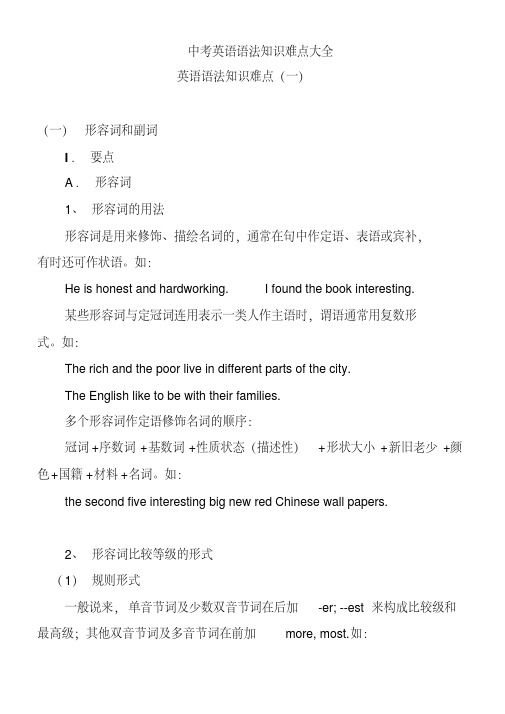
…"
⑤ You can never be too careful. 越小心越好 又如: You can never praise the teacher too highly. 你怎么赞扬这个老师也不过分。 ⑥ I have never spent a more worrying day. 那一天是最令我担心的一天。
( 3) beside, besides beside 意为 " 在 …旁边 " ,而 besides意为 "除 … 之外 "。如: He sat beside
me. What do you want besides this?
( 4) in the tree, on the tree in the tree 指动物或人在树上,而 on the tree 指果实、树叶长在树上
B。
例 2 ____ the worse I seem to be. A When I take more medicine B The more medicine I take C Taking more of the medicine D More medicine taken 解析:该题正确答案为 B。 "the+形容词比较级 +… , the + 形容词比较 级 +…"意为越 … ,越 … 。该句意为:吃的药越多,我的病越是加重。
I have never had a better dinner. 这是我吃过的最好的一顿饭。 ⑦ My English is no better than yours. 我的英语和你的英语都不怎么样。
B. 副词 1、 副词的种类 ( 1) 时间副词 如: ago, before, already, just, now, early, late, finally, tomorrow 等 ( 2) 地点副词 如:here, there, near, around, in, out, up, down, back, away, outside 等。 ( 3) 方式副词 如: carefully, angrily, badly, calmly, loudly, quickly, politely, nervously 等。 ( 4) 程度副词 如:almost, nearly, much, greatly, a bit, a little, hardly, so, very 等。
【中考】英语_语法知识总结_33页

中考英语语法知识难点大全英语语法知识难点(一)编稿:李俊和审稿:李俊和责编: 张晓俊(一)形容词和副词I.要点A.形容词1、形容词的用法形容词是用来修饰、描绘名词的,通常在句中作定语、表语或宾补,有时还可作状语。
如:He is honest and hardworking.I found the book interesting.某些形容词与定冠词连用表示一类人作主语时,谓语通常用复数形式。
如:The rich and the poor live in different parts of the city.The English like to be with their families.多个形容词作定语修饰名词的顺序:冠词+序数词+基数词+性质状态(描述性)+形状大小+新旧老少+颜色+国籍+材料+名词。
如:the second five interesting big new red Chinese wall papers.2、形容词比较等级的形式(1)规则形式一般说来,单音节词及少数双音节词在后加-er; --est 来构成比较级和最高级;其他双音节词及多音节词在前加more, most.如:great-greater-greatestbusy-busier-busiestimportant-more important-(the)most important(2)不规则形式good (well)-better-bestbad (ill)-worse-worstmany (much)-more-mostlittle-less-least(3)形容词比较等级的用法①表示两者的比较,用形容词的比较级+than. 如:He is cleverer than the other boys.This one is more beautiful than that one.②表示两者以上的比较,用"the +形容词最高级(+名词)+of(in) …"如:He is the cleverest boy in his class.③表示两者是同等程度,用"as +形容词原级+as". 如:He is as tall as I.I have as many books as you.④越… 越…例如:The more I learn, the happier I am.⑤You can never be too careful. 越小心越好又如:You can never praise the teacher too highly.你怎么赞扬这个老师也不过分。
历年中考英语语法知识点难点总结

中考英语语法知识难点大全英语语法知识难点(一)(一)形容词和副词I.要点A.形容词1、形容词的用法形容词是用来修饰、描绘名词的,通常在句中作定语、表语或宾补,有时还可作状语。
如:He is honest and hardworking.I found the book interesting.某些形容词与定冠词连用表示一类人作主语时,谓语通常用复数形式。
如:The rich and the poor live in different parts of the city.The English like to be with their families.多个形容词作定语修饰名词的顺序:冠词+序数词+基数词+性质状态(描述性)+形状大小+新旧老少+颜色+国籍+材料+名词。
如:the second five interesting big new red Chinese wall papers.2、形容词比较等级的形式(1)规则形式一般说来,单音节词及少数双音节词在后加-er; --est 来构成比较级和最高级;其他双音节词及多音节词在前加more, most.如:great-greater-greatestbusy-busier-busiestimportant-more important-(the)most important(2)不规则形式good (well)-better-bestbad (ill)-worse-worstmany (much)-more-mostlittle-less-least(3)形容词比较等级的用法①表示两者的比较,用形容词的比较级+than. 如:He is cleverer than the other boys.This one is more beautiful than that one.②表示两者以上的比较,用"the +形容词最高级(+名词)+of(in) …"如:He is the cleverest boy in his class.③表示两者是同等程度,用"as +形容词原级+as". 如:He is as tall as I.I have as many books as you.④越… 越…例如:The more I learn, the happier I am.⑤You can never be too careful. 越小心越好又如:You can never praise the teacher too highly.你怎么赞扬这个老师也不过分。
中考英语语法知识难点大全

中考英语语法知识难点大全【情态动词】情态动词与助动词I.要点助动词本身无意义,在句中帮助主要动词构成一定的时态,语态、语气,或是帮助构成否定句和疑问句,常用的助动词有be, do, have, shall(should), will(would).情态动词表一定的词义,本身并不表示动作或状态,而仅仅表达说话人的态度,它在句中须和主要动词一起构成谓语,主要的情态动词有can(could), may (might), must, have to, ought to, need, dare, shall, should, will, would.1、can 能,可以,表说话人同意,许可还可表客观条件许可,如:You can go now.提建议或请求时可用can I, can you表客气,如Can I buy you a drink? can和be able to表能力时的区别。
can表一般具有的能力,be able to表在特定条件下的能力,如:Although the driver was badly hurt, he was able to explain what had happened.2、may(1)、可以,表说话人同意,许可或请求对方许可。
You may go.(2)、(现在和将来)可能,也许,只用于肯定句和否定句中,如He may not be right.3、must, have tomust表主观上的必须,have to表客观上的必须,如:It's getting late.I have to go. -Must I go now. -Yes, you must.(No, you needn't./ No, you don't have to.)4、need, dare这二词有实意动词和情态动词两种词性,如用作实意动词后接动词不定式to do,如用作情态动词后接动词原形。
中考英语语法难点汇总精品文档10页
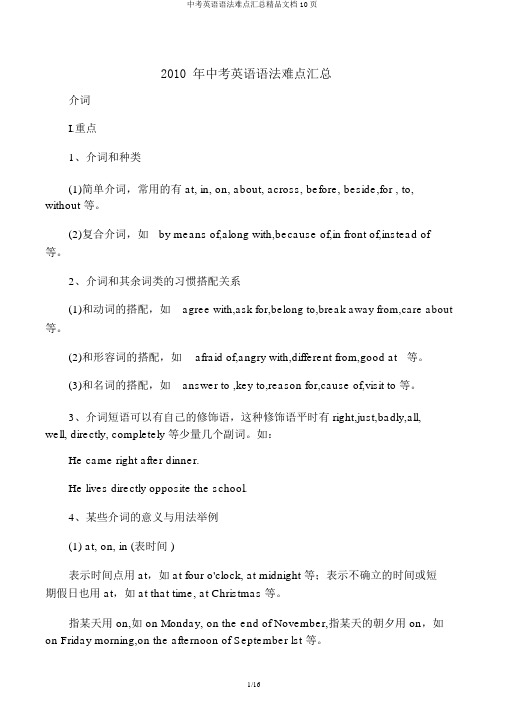
2010 年中考英语语法难点汇总介词I.重点1、介词和种类(1)简单介词,常用的有 at, in, on, about, across, before, beside,for , to, without 等。
(2)复合介词,如by means of,along with,because of,in front of,instead of 等。
2、介词和其余词类的习惯搭配关系(1)和动词的搭配,如agree with,ask for,belong to,break away from,care about 等。
(2)和形容词的搭配,如afraid of,angry with,different from,good at等。
(3)和名词的搭配,如answer to ,key to,reason for,cause of,visit to 等。
3、介词短语可以有自己的修饰语,这种修饰语平时有 right,just,badly,all, well, directly, completely 等少量几个副词。
如:He came right after dinner.He lives directly opposite the school.4、某些介词的意义与用法举例(1) at, on, in (表时间 )表示时间点用 at,如 at four o'clock, at midnight 等;表示不确立的时间或短期假日也用 at,如 at that time, at Christmas 等。
指某天用 on,如 on Monday, on the end of November,指某天的朝夕用 on,如on Friday morning,on the afternoon of September lst 等。
指于或短于一天的段用 in,如 in the afternoon, in February, in Summer, in 1999 等。
中考英语语法难点大全

义务教育基础课程初中教学资料介词I. 要点1、介词和种类(1) 简单介词,常用的有at, in, on, about, across, before, beside, for , to, without等。
(2) 复合介词,如by means of, along with, because of, in front of, instead of等。
2、介词和其他词类的习惯搭配关系(1) 和动词的搭配,如agree with, ask for, belong to, break away from, care about等。
(2) 和形容词的搭配,如afraid of, angry with, different from, good at(3) 和名词的搭配,如answer to , key to, reason for, cause of, visit to等.3、介词短语可以有自己的修饰语,这种修饰语通常有right, just, badly, all, well, directly, completely等少数几个副词。
如:He came right after dinner.He lives directly opposite the school.4、某些介词的意义与用法举例(1) at, on, in(表时间)表示时间点用at,如at four o'clock, at midnight等;表示不确定的时间或短期假日也用at,如at that time, at Christmas等。
指某天用on, 如on Monday, on the end of November, 指某天的朝夕用on,如on Friday morning, on the afternoon of September lst等。
指长于或短于一天的时段用in,如in the afternoon, in February, in Summer, in 1999等。
- 1、下载文档前请自行甄别文档内容的完整性,平台不提供额外的编辑、内容补充、找答案等附加服务。
- 2、"仅部分预览"的文档,不可在线预览部分如存在完整性等问题,可反馈申请退款(可完整预览的文档不适用该条件!)。
- 3、如文档侵犯您的权益,请联系客服反馈,我们会尽快为您处理(人工客服工作时间:9:00-18:30)。
中考英语语法知识难点大全英语语法知识难点(一)??? 编稿:李俊和审稿:李俊和责编: 张晓俊(一)形容词和副词I.要点A.形容词1、形容词的用法形容词是用来修饰、描绘名词的,通常在句中作定语、表语或宾补,有时还可作状语。
如:He is honest and hardworking. I found the book interesting. 某些形容词与定冠词连用表示一类人作主语时,谓语通常用复数形式。
如:The rich and the poor live in different parts of the city. The English like to be with their families. 多个形容词作定语修饰名词的顺序:冠词+序数词+基数词+性质状态(描述性)+形状大小+新旧老少+颜色+国籍+材料+名词。
如:the second five interesting big new red Chinese wall papers. 2、形容词比较等级的形式(1)规则形式一般说来,单音节词及少数双音节词在后加-er; --est 来构成比较级和最高级;其他双音节词及多音节词在前加more, most.如:great-greater-greatest busy-busier-busiest important-more important-(the)most important (2)不规则形式good (well)-better-best bad (ill)-worse-worst many (much)-more-most little-less-least (3)形容词比较等级的用法①表示两者的比较,用形容词的比较级+than. 如:He is cleverer than the other boys. This one is more beautiful than that one. ②表示两者以上的比较,用"the +形容词最高级(+名词)+of(in) …"如:He is the cleverest boy in his class. ③表示两者是同等程度,用"as +形容词原级+as". 如:He is as tall as I. I have as many books as you. ④越…越…例如:The more I learn, the happier I am. ⑤ You can never be too careful. 越小心越好又如:You can never praise the teacher too highly. 你怎么赞扬这个老师也不过分。
⑥ I have never spent a more worrying day. 那一天是最令我担心的一天。
I have never had a better dinner. 这是我吃过的最好的一顿饭。
⑦ My English is no better than yours. 我的英语和你的英语都不怎么样。
B.副词1、副词的种类(1)时间副词如:ago, before, already, just, now, early, late, finally, tomorrow等(2)地点副词如:here, there, near, around, in, out, up, down, back, away, outside等。
(3)方式副词如:carefully, angrily, badly, calmly, loudly, quickly, politely, nervously等。
(4)程度副词如:almost, nearly, much, greatly, a bit, a little, hardly, so, very等。
2、副词比较等级的用法其用法与形容词相似,只是副词最高级前可省略定冠词。
如:Of all the boys he sings (the) most beautifully. We must work harder. 3、某些副词在用法上的区别(1) already, yet, still already表示某事物已经发生,主要用于肯定句;yet表示期待某事发生,主要用于否定句和疑问句;still表示某事还在进行,主要用于肯定句和疑问句,有时也可用于否定句。
如:We've already watched that film. I haven't finished my homework yet. He still works until late every night. (2) too, as well, also, either too, as well 和 also用于肯定句和疑问句,too和as well多用于口语,一般放在句末,而also多用于书面语,一般放在句中与动词连用。
either用于否定句和否定的疑问句,往往放在句末。
如:He went there too. He didn't go there either. I like you as well. I also went there. (3) hard, hardly hardly意为"几乎"与hard在词义上完全不同。
如:I work hard every day. I can hardly remember that. (4) late, lately lately 意为"最近、近来",late意为"晚、迟"。
如:He never comes late. Have you been to the museum lately?II.例题例1 Tom's father thinks he is already ____ A high enough Btall enough C enough high C enough tall 解析:该题正确答案是B。
修饰人高用tall, 而建筑物的高用high,并且enough修饰形容词要放在形容词后面。
因此该题选B。
例2 ____ the worse I seem to be. A When I take more medicine B The more medicine I take C Taking more of the medicine D More medicine taken 解析:该题正确答案为B。
"the+形容词比较级+… , the +形容词比较级+…"意为越…,越…。
该句意为:吃的药越多,我的病越是加重。
例3"I haven't been to London yet". "I haven't been there ____". A too B also C either D neither 解析:该题正确答案为C。
A和B都用于肯定句中。
D-neither本身意为否定"两者都不",而C-either则用于否定句中,意为"也"。
例4 Mr Smith was ____ moved at the news. A deep B deeply C very deep D quite deeply 解析:该题正确答案为B。
A. deep用于副词时,修饰具体的深,如dig deep,而B-deeply则修饰表示感情色彩的词,如该题为deeply moved.另如deeply regret等。
而D-quite和deeply均为副词,不能互相修饰。
(二)介词I.要点1、介词和种类(1)简单介词,常用的有at, in, on, about, across, before, beside, for , to, without等。
(2)复合介词,如by means of, along with, because of, in front of, instead of等。
2、介词和其他词类的习惯搭配关系(1)和动词的搭配,如agree with, ask for, belong to, break away from, care about等。
(2)和形容词的搭配,如afraid of, angry with, different from, good at (3)和名词的搭配,如answer to , key to, reason for, cause of, visit to等. 3、介词短语可以有自己的修饰语,这种修饰语通常有right, just, badly, all, well, directly, completely等少数几个副词。
如:He came right after dinner. He lives directly opposite the school. 4、某些介词的意义与用法举例(1) at, on, in(表时间)表示时间点用at,如at four o'clock, at midnight等;表示不确定的时间或短期假日也用at,如at that time, at Christmas等。
指某天用on, 如on Monday, on the end of November, 指某天的朝夕用on,如on Friday morning, on the afternoon of September lst 等。
指长于或短于一天的时段用in,如in the afternoon, in February, in Summer, in 1999等。
(2) between, among(表位置)between仅用于二者之间,但说三者或三者以上中的每两个之间的相互关系时,也用between, 如I'm sitting between Tom and Alice. The village lies between three hills. among用于三者或三者以上之间。
如:He is the best among the students. (3) beside, besides beside意为"在…旁边",而besides意为"除…之外"。
如:He sat beside me. What do you want besides this? (4)in the tree, on the tree in the tree 指动物或人在树上,而on the tree 指果实、树叶长在树上(5)on the way, in the way, by the way, in this way on the way 指在路上 in the way 指挡道by the way 指顺便问一句 in this way 用这样的方法(6)in the corner, at the corner in the corner 指在拐角内at the corner 指在拐角外(7)in the morning, on the morning in the morning 是一般说法 on the morning 特指某一天的早晨(8)by bus, on the bus by bus 是一般说法 on the bus 特指乘某一辆车II.例题例1 Do you know any other foreign language____ English? A except B but C beside D besides 解析:A、B两项except等于but,意为"除了…",C-beside 意为"在…旁边",不符合题意。
